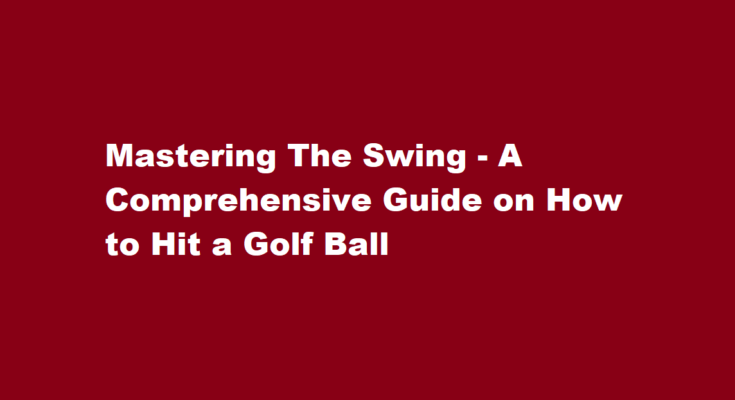Introduction
Golf is a sport renowned for its precision and finesse. While it may seem deceptively simple, hitting a golf ball effectively requires a combination of skill, technique, and practice. Whether you’re a novice or a seasoned player, this article will delve into the fundamentals of hitting a golf ball to help you improve your game. By focusing on grip, stance, swing, and mental aspects, you can take your golf game to the next level.
The Right Grip
The foundation of a good golf swing begins with the grip. A proper grip ensures control and consistency in your shots. To establish the ideal grip, follow these steps
- Interlock or Overlap There are two primary grips – interlocking and overlapping. The interlocking grip involves locking the pinky finger of your trailing hand (right hand for right-handed golfers, left hand for left-handed golfers) with the index finger of your lead hand. The overlapping grip simply overlaps the little finger of the trailing hand over the index finger of the lead hand. Choose the one that feels more comfortable to you.
- Neutral Position Place your hands on the club so that the “V” formed by your thumb and forefinger points towards your trail shoulder. This helps square the clubface at impact.
- Pressure Apply gentle pressure with your fingers, ensuring a secure grip without squeezing too tightly, which can restrict your wrist movement.
Proper Stance
Your stance is a critical factor in achieving a consistent and powerful golf swing. Follow these guidelines for the correct stance
- Foot Position Stand with your feet shoulder-width apart. The lead foot should be pointed directly at the target, while the trailing foot should be slightly flared outwards.
- Ball Position The position of the golf ball in your stance varies depending on the club you’re using. Generally, for shorter clubs like wedges, place the ball in the middle of your stance. As you move to longer clubs, the ball should gradually move forward in your stance, until it’s aligned with the inside of your lead heel for the driver.
- Posture Bend at the hips and keep your back straight. The knees should be slightly flexed. This posture helps you maintain balance throughout the swing.
The Golf Swing
The golf swing is where the rubber meets the road, and mastering it is crucial for hitting the ball effectively. A golf swing can be broken down into several key elements
a. Address Position Start with the clubhead behind the ball, feet in the correct stance, and a comfortable grip.
b. Takeaway Begin the backswing by rotating your hips and shoulders, keeping your wrists firm, and maintaining a straight left arm (for right-handed golfers). Ensure a smooth and controlled motion.
c. Backswing Continue to rotate your shoulders and hips, lifting the club to the top of your swing. This should form a 90-degree angle between your left arm and the clubshaft.
d. Transition Begin the downswing by shifting your weight from the trailing foot to the lead foot. Start the rotation of your hips, pulling the club down.
e. Impact The moment of truth! Ensure that the clubface strikes the ball squarely, leading to a clean and powerful shot. Your hands should be slightly ahead of the clubhead at impact.
f. Follow-Through After striking the ball, let the momentum of your swing carry you through to a full finish. Your body should face the target, and your weight should be on the lead foot.
Mental Aspect
Golf is as much a mental game as it is a physical one. Here are some key mental aspects to consider when hitting a golf ball
a. Visualisation Before each shot, visualise your intended shot trajectory and target. This helps you focus on your goal and improves your chances of success.
b. Stay Calm and Confident It’s crucial to maintain composure, especially in high-pressure situations. Confidence in your abilities and staying calm can significantly impact your performance.
c. Routines Develop a pre-shot routine to ensure consistency and build confidence. This might include a specific number of practice swings or deep breaths before each shot.
d. Positive Self-Talk Avoid negative self-talk, which can erode confidence. Instead, focus on positive affirmations and constructive self-feedback.
Practice and Feedback
Hitting a golf ball effectively requires practice, practice, and more practice. Regularly visit the driving range to hone your skills. Consider taking lessons from a golf professional who can provide valuable feedback on your technique. Video analysis of your swing can also be immensely helpful in identifying areas for improvement.
FREQUENTLY ASKED QUESTIONS
What is a proper golf stance?
Your knees should be flexed. For your starting position, your legs should be shoulder width apart. If you are using a middle iron, this is your stance. Widen your stance for longer clubs such as drivers or woods. For short irons or wedges, bring your stance in by an inch or two.
Which way do I shoot in golf?
As GOLF Top 100 Teacher Terry Rowles explains here, there’s no right or wrong way of doing it. When a right-handed player plays golf left-handed, or vice-versa, your dominant arm becomes your lead arm, which can make it harder to release the club.
Conclusion
Hitting a golf ball effectively is a combination of the right grip, stance, swing, and a strong mental game. It’s a sport that requires dedication, practice, and a willingness to continually improve. By mastering these fundamental elements, you can elevate your golf game and enjoy the satisfaction of consistently hitting the ball with power and precision. Remember, golf is a lifelong pursuit, and even the pros are continually refining their skills. So, embrace the journey, keep learning, and enjoy the beautiful game of golf.
Read Also : A Comprehensive Guide on How to Set Up Your Honeywell Thermostat



